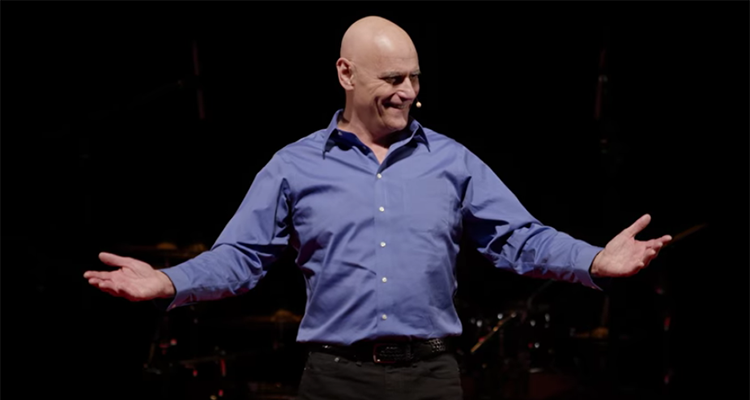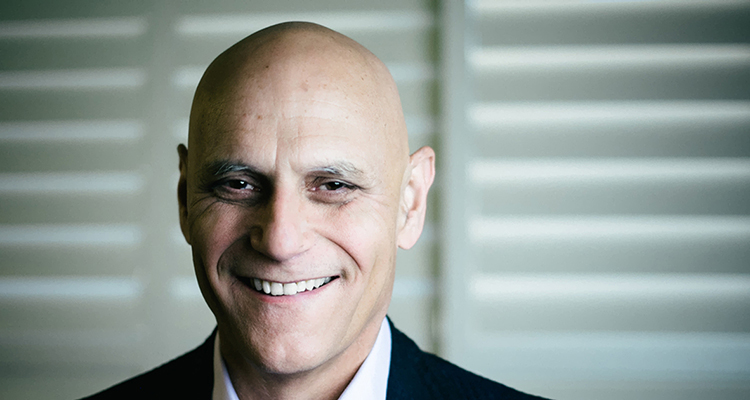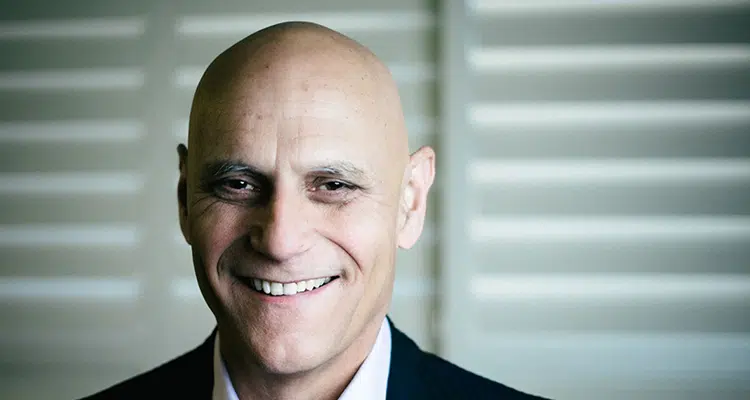Steven Hayes: The Importance of ACT for Insomnia
With millions of people struggling to achieve quality sleep, it’s no wonder that scientists, medical professionals, and sleep experts are working tirelessly to find the solution to the age-old question, “Why am I not sleeping well?”

With 30% of adults finding it difficult to fall and stay asleep on a regular basis and another 68% reporting they have trouble sleeping occasionally, the world is alarmingly sleep-deprived. What’s even more unnerving is that chronic sleep deprivation and lack of deep, restorative sleep can cause a myriad of physical and mental health issues. Insufficient sleep puts you at higher risk of obesity, heart disease, and certain cancers. People who suffer from insomnia and other sleep disorders are also more likely to develop depression or anxiety and report chronic stress.
In an effort to offer the sleep-deprived population some much-needed relief, sleep experts have researched and developed innovative insomnia treatment programs and techniques. One such expert is Steven Hayes. With a heavy focus on acceptance and commitment therapy (ACT), Hayes has revolutionized the world of sleep medicine. Read on to learn more.
Content
Steven Hayes’ Career and Credentials
Steven C. Hayes is a Nevada Foundation Professor of Psychology at the University of Nevada, specializing in behavioral analysis. In his career, Hayes has published nearly 50 books and authored 670 scientific articles. Most of his work focuses on the analysis of human language and cognition and how it applies to understanding and alleviating human suffering, including insomnia and other sleep disorders.

Hayes is the developer of the Relational Frame Theory and spends most of his time researching human higher cognition. He’s also worked to extend this theory into the world of acceptance and commitment therapy (ACT). This evidence-based form of psychotherapy uses mindfulness, acceptance, and value-based methods to help patients become more accepting of their thoughts and feelings. ACT is commonly used to treat certain mental health conditions and ease symptoms associated with insomnia and other sleep disorders. Hayes is also the co-developer of Process-Based Therapy (PBT), which is a more evidence-based therapy used to treat certain psychological problems.
Some of Dr. Hayes’ most notable accomplishments include writing the #1 best-selling self-help book, Get Out of Your Mind and Into Your Life, and hitting over 1 million views on his YouTube TED Talk presentations. Hayes has held the position of president of Division 25 of the APA, the American Association of Applied and Preventive Psychology, the Association for Behavioral and Cognitive Therapy, and the Association for Contextual Behavioral Science.
Hayes helped create the Association for Psychological Science and was the organization’s first secretary and treasurer. He also served a 5-year term on the National Advisory Council for Drug Abuse in the National Institutes of Health. Rated in the top 1% of professionals in his field, Hayes sits on the advisory board of USERN and is a fellow of the American Association for Advancement of Science. In 1992, Hayes was listed as the 30th “highest impact” psychologist in the world by the Institute for Scientific Information. He’s also ranked in the top 1,100 of scholars in his area of study according to Google data. Among his achievements, Hayes has received the Impact of Science on Application Award and the Lifetime Achievement Award from the Association for Behavioral and Cognitive Therapy.
What is ACT and How Does It Work?
Acceptance and commitment therapy (ACT) is an action-orientated form of psychotherapy that stems from CBT (cognitive behavioral therapy). Patients learn to stop suppressing, avoiding, and struggling with their inner thoughts and emotions and, instead, accept these feelings for what they are. Individuals soon realize that their emotional reactions are appropriate in certain situations and learn to navigate these feelings without letting them control their lives. Part of the equation involves a commitment to making necessary changes in behavior, regardless of preexisting feelings or beliefs on a particular subject.

ACT has proven very effective in treating everything from stress, anxiety, and OCD to substance abuse, chronic pain, and insomnia. Dr. Hayes is a strong advocate for acceptance and commitment therapy and its ability to ease human suffering and improve a person’s quality of life.
Dr. Hayes’ Contributions to ACT
Hayes states that acceptance is one of the most powerful skills a person can have. It’s about the ability to feel uncomfortable while doing the things in your life that matter. Dr. Hayes also explains that ACT helps you feel the full range of your emotions without avoidance. This is often easier said than done, which is why ACT takes time and practice to master.
In terms of sleep, an example of avoidance would be not going to bed until the wee hours of the morning because you “know” you won’t get a good night’s sleep anyway. Not only is this assumption false, but it breeds even more negative thoughts and emotions surrounding sleep. This can also increase the stress and anxiety you feel at nightfall, worsening insomnia symptoms.
Dr. Hayes examines exercise as a prime example of how ACT works over time. When you start a workout routine, you might practice stretching. Even though you won’t have to stretch and touch your toes very often in daily life, you will have to bend over to pick things up. Now, you’re utilizing the skill of stretching in other areas of your life. Another example is standing on a balance board while exercising. You don’t necessarily need this skill so you can walk a tightrope, but it sure does come in handy when navigating an icy driveway. Hayes points out that during your exercise routine, you’ll practice movements and skills that may not matter in the specific moment, but instead, are being added to your skill-set for future use. Once established, you can apply these movements and skills to real-world obstacles.
When discussing acceptance, Hayes suggests practicing it when it “doesn’t matter” so that you have the skill in your wheelhouse when it does matter most. Dr. Hayes recommends practicing acceptance when you aren’t feeling anxious, sad, angry, or stressed. Instead, practice it when you’re relaxed and mentally present. Then, when you’re feeling those negative emotions, you can use the skills you’ve learned to work through them. Hayes suggests deliberately practicing acceptance in “small emotional stretches”. He also says that the time to work on acceptance skills is before you really need them.
What is ACT-i?
You may be wondering what all this has to do with insomnia. ACT-i, or acceptance and commitment therapy for insomnia, helps insomnia patients accept the negative feelings and worries they have about sleep while awake, without trying to resist them. One study suggests that accepting these thoughts reduces the brain’s level of nocturnal arousal. This encourages a state of relaxation and sleepiness rather than a battle against wakefulness. Basically, once you stop fighting your emotions and simply let them pass by, you become more relaxed and less stressed. Over time, you can improve sleep quality and reduce insomnia symptoms and sleep disruptions.

ACT-i does more than just help you accept your emotions. It also offers strategies and practical changes that will increase your likelihood of achieving quality sleep. By reducing unhelpful patterns of behavior and avoidance, you can create a positive environment for sleep. This combination of emotional acceptance and commitment to change is where the secret to easing insomnia symptoms lies.
Dr. Hayes has his own unique take on ACT-i. In one article, he states that if you’re having a hard time falling asleep, the best thing you can do is nothing at all! Remember that ACT differs from CBT in that it’s about accepting your emotions and thoughts without letting them control you. If you’ve ever been lying in bed, half-asleep, and a thought or problem enters your mind, what happens? You become instantly alert and more awake as your brain struggles to sort through these new ideas and solve whatever problem you’re facing. Dr. Hayes compares this to a mental “sprint around the block”. By applying the principles of ACT, you can accept these thoughts and release them, committing to dealing with them in the morning and not letting them interfere with your ability to fall asleep at that moment.
Dr. Hayes refers to this as psychological flexibility. He states that it’s okay to acknowledge these thoughts and feelings when they show up, but encourages you to gently attend to them and move in a direction of value (closer to sleep) instead of letting these thoughts fully arouse or awake you. Dr. Hayes suggests insomnia sufferers notice their internal temptation to problem-solve at that very moment and instead, do nothing! This mental battle isn’t completely our fault, either. While your physical body knows it needs sleep, your mind has a hard time relaxing and slowing down. Certain studies show that this psychological inflexibility plays a key role in a variety of sleep disorders and problems. By teaching people to be more psychologically flexible, they can reduce insomnia symptoms as well as chronic pain and fatigue.
Sleep Tips from Dr. Hayes
Our minds are naturally resistant. But they’re also very resilient. The minute you tell yourself not to think or worry about falling asleep, that’s the first place your mind goes. Now, you’re hyperfocused on the fact that you can’t fall asleep and your stress and anxiety levels are through the roof. Dr. Hayes explains that trying to suppress your nighttime thoughts and feelings or forcing yourself to go to sleep won’t work. If you’ve ever spent hours staring at the ceiling, wide awake, you know this to be true. Instead, Dr. Hayes says it’s time to become psychologically flexible.

Here are three techniques you can try right now.
Don’t Try to Sleep, Rest Instead
For most people, it’s the focus on trying to sleep that actually keeps you awake. Instead, let yourself simply rest. Respectfully decline your mind’s desire to problem-solve. By focusing on relaxing your mind and letting go of racing thoughts, you’re more likely to fall asleep faster or fall back to sleep more easily after waking up in the middle of the night.
Take Notice
If worrying is keeping you awake, instead of examining it, just notice it. Dr. Hayes says that when these worries arise, picture them as words written on leaves that are slowly falling from the sky or floating down a river. Let them come in and then go out. Notice them without passion, feeling, or judgment. It may sound too simple, but Dr. Hayes says that’s all it takes sometimes. No adding or subtracting. Just noticing.
Accept Your Thoughts, Feelings, and Beliefs About Insomnia
Dr. Hayes says that this doesn’t mean resigning yourself to a life of sleepless nights. Instead, it means being present in your reactions to your sleep troubles without trying to manipulate them. Hayes says that instead of rejecting these reactions, hold them gently the same way you would a child. Then, let your body do what comes naturally. Sleep!
Dr. Hayes says that these are simple techniques to experiment with. They’re not a guaranteed cure for insomnia. In some cases, these methods may be counterintuitive, but Hayes says that you won’t know until you try.
Comprehensive Insomnia Treatment
While there are plenty of pills and medications that promise you a good night’s sleep, there’s no magic pill that will totally eliminate your insomnia symptoms. With that being said, by experimenting with different techniques and keeping an open mind, you can find the methods, therapies, and treatments that work best for your unique needs.

Dr. Hayes claims that ACT is a viable way to improve your sleep and overall quality of life. Many other sleep experts agree and also focus heavily on CBT-i as a holistic way to ease insomnia symptoms and reduce negative thoughts surrounding sleep. At Somnus Therapy, we utilize both of these methods along with meditation, mindfulness, and sleep education to help you finally achieve the blissful night’s sleep you deserve.
Are you ready to learn more? Click here to get started.














